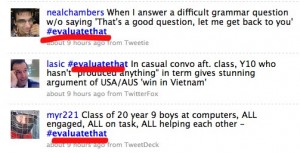Source: http://www.personalizemedia.com/garys-social-media-count/
There is a frivolous and a serious side to this title.
A few days ago, I came across the story titled “Teachers banned from contacting students on social networking sites“. It was an unnerving read about a knee-jerk reaction by Education Queensland over several incidents involving contacts between teachers and students by way of online social networking (SN). Unnerving because I have been successfully using social networking tools to connect with a number of current and former students over the past year.
My first reaction was – this stinks! The reaction of several of my (ex)students on Twitter and in class was – this stinks! The fury of fellow ed-tech folk was palpable on Twitter and in the blogosphere, the phrase “21st century” got mentioned a lot. The comments on the story’s website were an expectedly polarised mixture of “about bloody time” (mostly from people who don’t REALLY understand the methods, let alone the principles of social networking online) and “outrage” by people who have actually used social networking with students and benefited from it.
I didn’t leave a comment on the story but chose to sit on it for a few days, thinking.
Firstly, while the ban and particularly the lunacy of keeping teachers websites “private and appropriate” is unenlightened at best, I am sure that Education Queensland had the best interest of kids in mind, no matter how misguided the edu-crats may be. There clearly had been some breaches of trust and some inappropriate behaviour (I don’t condone it but then the number is relatively low considering probably tens of thousands of such ‘communications’).
As I reflect on this debate, I think this matter goes beyond the domain of education and a “few bad apples” causing others who use SN responsibly to suffer. It is a matter of divorcing education from the culture and society in which it is embedded into a kind of narrow technical pursuit by ‘experts who know’ (more on that in our ‘Why is everyone an expert on education?’ series, next installment close to publishing).
For better or worse, we are swimming in social media (see the stats above), it is a growing part of our cultural, social, political, economic and with it (why not?) educational life. Unless we make some enlightened and wise choices, decisions on such awesome tools of (ab)use will continue to be made by educators who have increasingly little power in the broader culture but fear losing their modest power in the educational establishment. To put it simply with a question: Ban it? Until when exactly?
How about leave it to the teachers and students? By all means, provide guidelines and warnings on content with sexualised nature, innuendo and stupidities like that. Social networking tools do make abuse easier to commit and distribute in time and space by people bent on abusing children or plain idiots. They can also be a wonderful way to connect, extend, humanise our teaching and learning in ways consistent with the century we live in. On the abuse prevention flipside, because these networks ARE social, they can quickly spot, even track and police (potential) offences. After all, friends are still one of the best weapons against bullying and abuse, aren’t they? Let’s talk with the kids (not AT them) and become wise TOGETHER about online behaviour, what is appropriate and why so. The idea that you control the mouse but don’t control the signal still needs to be bedded down in minds of kids, parents and educators (and politicians, obviously).
So is student-teacher social networking all good then? Not so fast, not just yet …
Online predators and abusers are a real problem. But let’s not make a leap that every teacher online is a predator or at least has stupid, if at least unsavoury intentions. If anything, it is the students that are probably more likely to be predatory and abusive. Don’t believe it? Just wait till a disgruntled teenager unleashes an MSN fury about you being a ‘crap teacher’ because she failed that test by 2%, and which you marked with utmost professional integrity.
Another issue is one of time. For all its benefits, social networking can become quite taxing on teachers’ time. Teaching is a caring profession, one where relationships do and should matter. Caring for too many students online, usually as a supplement to face-to-face contact, could spread one’s teaching resources thinly. It could even breed misguided resentment “he doesn’t ever reply to our posts, he doesn’t care” or “he doesn’t want to be friends on Facebook, he is not friendly” etc. There is also a danger that because of the ‘always on call’ attitude, students will come and ask questions and seek help for problems they could be better off solving and struggling with themselves. And they will do that at often inappropriate, inconvenient times. Being a node, to use connectivist lingo, is OK but being a hub with the approval switch for all traffic would probably often work against the independent learning of students, something social networking tools have such a wonderful potential to support and sustain when used wisely.
And let’s not forget that old nut… While privacy is a button to click and filter to turn on in this hyper-connected world, it should not be dismissed lightly either. Invoking the platinum rule (“Treat others the way they want to be treated”) could be increasingly important or the SN tools may deliver disappointment and, at worst, abuse.
Final thoughts
This reflection began with the question “should teachers be allowed to connect with students over SN?” This is an edu-technical issue – ban or not ban. At a much deeper level, SN is about the potential to rock the boat of the restrictive, binary teacher – student divide we are so comfortable with and used to. For now, we (can) run projects and tinker on the edges with SN occasionally bridging that divide. However, it can be very taxing and quite possibly (un)helpful in many ways to be a (traditional) teacher, connector, assessor, judge, evaluator, crying shoulder, confidante, ‘buddy’ and many other things to cohorts of students 24/7 online and face-to-face. Context rules – let’s have a mature conversation about it.
But if we genuinely open up spaces where these roles are re-defined, re-imagined, in some cases even completely reversed, social networking could be an incredibly useful, perhaps essential tool in fundamentally re-shaping education towards a (post-industrial) model of cross-generational mentorship. I am passionate about working towards it but I’d continue to wisen up on social networks and by all means use them with students and colleagues … judiciously.
‘Judiciously’ not because I don’t use, like or trust my social networks (I love them!) but because the ‘bleeding edge’ we are at sometimes requires its pint of blood I’d rather donate than have it drawn without my approval.
And the punsy title?
What else is education other than a social network, seemingly supressed, blocked and banned in its 21st century incarnation. Not work? You be the judge…






